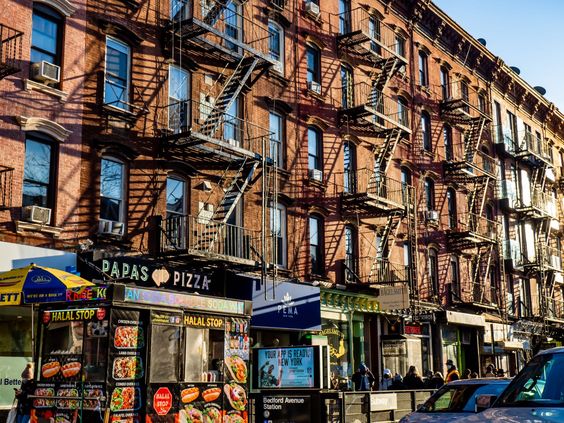Was it the water, the smell of Levy’s freshly baked bread delivered to my father’s deli? Is it the air laden with aromas from all the Italian, Greek, German, and Chinese restaurants, or the world’s best pizza billowing odorous air streams into the streets, making you want to manga? Was it the Fox theater on Flatbush Avenue where Alan Freed (who coined the phrase “rock and roll”) 50s rock shows featured Chuck Berry, Little Richard, Elvis Presley, Bill Hailey, and the Comets? Was it the Italian or Black kids singing acapella, echoing their fifties rock and roll chops in the subway halls or under streetlamps that created its musical vibe? Was it the aroma of the famous Nathans Hotdogs, the Ferris wheel ride taking your breath away as you circled the top and viewed the ocean and ant like inhabitants on the boardwalk at Coney Island. Or was it the immigrants and their first-generation children who refused to accept they were second-class citizens and overachieved?
In the 1880s Brooklyn was one of the country’s most prolific manufacturing centers. Its shipping ports handled more tonnage than Manhattan and more sugar refining than anywhere else in the country. Brooklyn’s ironworks, petroleum refineries, slaughterhouses, toys, food products, breweries, and electrical manufacturers were humming. Except for the few years our country experienced the depression, successful, local grocery and candy stores, butcher shops, and independent mom-and-pop clothing stores were omnipresent in each neighborhood.
Sections of Brooklyn were filled with vendors hawking their wares from pushcarts, much like Manhattan’s lower east side immigrant neighborhoods. Staples like fruit, vegetables, socks, hats, pots, and pans were sold. “Mister, you won’t find a lower price on these shoes; genuine leather, will last a lifetime, too much, make; me an offer.” These newly anointed Americans didn’t become rich. Still, they could live in an apartment with heat in the winter, hot and cold running water, and, if they were lucky, their own bathroom.
Maybe it was the connectivity and infusion of belonging, even if you were an immigrant. So many of our commonalities make the cliché “you can take the boy out of Brooklyn, but you can’t take Brooklyn out of the boy” relevant. Was it the endless parade of places you could escape to and expand life-affirming and educating experiences only a modest walk, subway, or bus ride away?
So much of the credit for Brooklyn’s achievers belongs to our collective immigrant first or second-generation parents. They sacrificed their existence to make us excel in the arts, education, and science. Or survive gangland style in the teaming tenements and the new world’s crowded, noisy streets.
Maybe a part of it was the immigrant neighborhoods that created a safety net in the new world and at the same time squeezed your ambitions, like a bursting pimple eagerly awaiting the freedom to escape the poverty and glass ceiling imposed by living in an isolated neighborhood.
Because of its Ultra-Orthodox Jewish residents, Brooklyn is nicknamed “the most Jewish place on Earth”, and home to the world’s largest Jewish community. With over 600,000 residents living in the borough, a population individually greater than Tel-Aviv and Jerusalem.
My father worked six days a week, about 10 hours a day, on his feet all day, at various Delicatessen Restaurants as a union counterman. He worked even harder when he had his own deli with my uncle. He’d come home from work, sit down for just a minute, and immediately fall asleep. Only to be awoken by my mother beckoning him to eat something. Like many children of Brooklyn immigrants, our parent’s work ethic was passed down to us. My brother and I are the recipients of it, earning a small piece of the pie, allowing us to increase ours.
All you had to do was peruse down the halls in the tenement we lived in, and the smells would take you on a journey around the world. The dialects from so many immigrant parents would create the signature linguistic style of the Dems, Dose, and the “so how ya doin” greeting influencing our diction. Now its morphed into the language of rap, with its unique and colorful style.
Brooklyn is a who’s who of the Famous and Infamous.
No other city or state in the country gave birth to so many influential over achievers in the late 1800’s through the early 1950’s. No borough in New York, not even the Bronx, Statin Island, Queens, or Manhattan.
So many celebrities, politicians, writers, and athletes were born in the Borough that gave birth to dem “Brooklyn Bums,” The Brooklyn Dodgers. It’s where Jackie Robinson, who started in 1947 at first base, broke the color barrier in major league baseball and brought dem bums to national prominence. The Brooklyn Dodgers is the only major league baseball team in the country named after a borough instead of a city or state. Jackie Robinson was one of two sports heroes of mine. Not only because of what he accomplished on the field and the abuse he had to overcome, but more importantly, the fortitude he exhibited in fighting for civil rights.
Sandy Koufax was the second of my all-time Brooklyn sports heroes. He was a left-handed Jewish pitcher born in Brooklyn. He played his entire Major League Baseball (MLB) career for the Brooklyn / Los Angeles Dodgers from 1955 to 1966. He is the youngest player ever elected to the Baseball Hall of Fame. In the first game of the 1963 world series, he struck out a record 15 Yankees. I was blown away and so proud when I learned he was Jewish. At the time, only a handful of baseball players in the country were Jewish. His decision not to pitch during the Jewish High Holidays, even during a world series game, made him a hero to me.
Brooklyn gave birth to Jerry Seinfeld, Jimmy Fallon, Spike Lee, Barbara Streisand, Neil Diamond, Michael Jordin, Bernie Sanders, Chuck Schumer, and Janet Yellen, the first woman to be the United States Secretary of the Treasury. Rita Hayworth. Larry David. Richard Dreyfuss. George Gershwin, Ruth Bader Ginsberg, and John August Roebling. As well as Rudy Giuliani, Meyer Lansky, Neil Simon, Betty Smith (A Tree Grows in Brooklyn), Mel Brooks, Woody Allen, Alan Arkin, Isaac Asimov, Red Auerbach, Cal Abrams, Henry Ward Beecher, Shirley Chisholm, Howard Cosell, Harvey Firestein, Bobby Fisher, Larry David, Jay Z, Mary Tyler More, Eddie Murphy, Mae West, Walt Whitman, and hundreds more that broke the sound barrier in their respective fields.
All Brooklynites are not created equal.
They say that all men are created equal, which can be true until you get home from the hospital.
Life started for me at the Brooklyn Jewish hospital, where my release was delayed because another Michael Rosen was born there, whose parents couldn’t or wouldn’t pay their hospital bills-giving my mother the perfect platform for raining me in with Jewish guilt. I heard, giving birth to me was like the aftermath of being constipated for a month, the pain, the suffering. Then to add insult to injury, getting me out of the hospital was like pulling teeth.
Jewish mothers’ control over their kids took many forms. For instance, did you know that if you ate grapes and swallowed the pits, a grape tree grows in your stomach? There’s also the cliché about not leaving leftover food on your plate because the kids in Europe are starving. Which most certainly was rooted in our struggling European heritage. The best, politely put, was that dating a non-Jewish girl would create a greater chance of getting children out of wedlock than dating a Jewish girl. I couldn’t wait to find my first Christian girlfriend.
Brownsville, Brooklyn, where I was born, was the densest tenement, low-income, populated borough in NY. It still produced some of the country’s most significant famous, and infamous citizens: Zero Mostel is known for his iconic role in Fiddler on the Roof; Mike Tyson, the heavyweight boxing champion; Abe Reles, the most feared hit man from Murder Inc. Isidor Isaac Rabi, an American physicist who won the Nobel Prize in Physics in 1944 for his discovery of nuclear magnetic resonance imaging, used in radar and microwave ovens. Al Sharpton Jr. an American civil rights activist, Baptist minister, talk show host, and politician. Lyle Alzado, an all-pro National Football League defensive end, and Paul Caravello, the drummer for the rock band Kiss.
Brooklyn a mosaic of immigrants.
In1636 Dutch farmers settled in Brooklyn; by 1855, half the foreign-born residents were Irish, and the rest were British and German. That changed dramatically when a second wave of immigrants started arriving in the late 1880s and continues today. In the 20s and 30s, most came from Europe and were Russian Jews, Italians, Poles, and a small mixture from Scandinavian countries. In the early 30s, a new wave came, African Americans escaping Harlem and the south and Puerto Ricans looking for the same opportunities my Grandparents had. They settled in neighborhoods where they felt welcomed and dominated different sections of the borough. It was Brooklyn’s strength as well as its weakness. Cocooning inhabitants was influential in their survival. However, when diversity was necessary within these conclaves, it was divisive.
As a result of Brownsville’s dominant Brooklyn Jewish heritage, several streets are named after Jewish community figures in the western portion of Brownsville, Brooklyn. In 1913, nine years after writer Theodore Herzl died, residents successfully petitioned to rename Ames Street to Herzl Street. One of the few streets outside Israel is named Herzl Street. Born in 1860, he was an Austro-Hungarian Jewish journalist, playwright, political activist, and writer who was the father of modern political Zionism. Herzl formed the Zionist Organization and promoted Jewish immigration to Palestine to create a Jewish state.
A block away, the incorrectly spelled Strauss Street was named after two former Macy’s and Abraham & Straus Department store co-owners, brothers Nathan and Isidor Straus. Macy’s was founded in 1858 by Roland H. Macy. Subsequently, the Straus brothers purchased an interest in the store starting in 1887 and assumed complete control in 1896. Isidor and his wife Ida died when they gave up their seats for children and young women on a lifeboat during the sinking of the RMS Titanic. Isidor also paid for Otto Franks passage to NY, which included a job offer. Otto Frank was the father of the famous Ann Frank whose diary was published after Nazis killed her in WW11. Otto Frank survived, both the Nazis and the Titanic.
The Macy’s 34th street flagship store, with 1.25 million retail selling square feet, is the largest in the United States and among the largest in the world. A&S (Abraham & Strauss), a downtown Brooklyn department store, later became a Macy’s. It was your shopping destination when you aspired to or became middle class. Down the block was Junior’s restaurant, known for having the “world’s most fabulous cheesecake.” The landmark location restaurant, founded in 1950, is located on Cheesecake Corner and Harry Rosen Way–aka Flatbush Avenue EXT and DeKalb Avenue. If you headed down Dekalb avenue, past the projects, Pratt Institute, and the local police precinct to Marcy Avenue, you ended up at my father’s Deli. Coincidently my father’s name was Harry Rosen, the same as Junior’s founder. Juniors is still flourishing today in the exact location on Flatbush Avenue.
Even after living down south for 14 years, Brooklyn is still in my DNA. When my southern neighbors and people at businesses I frequent ask where I am from, I tell them Mount Juliet TN, but my parents sent me to Brooklyn for elocution lessons.
Mike Rosen








